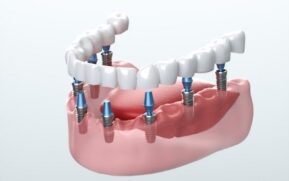
Cosmetic dentistry is any dental work done to enhance a person’s physical appearance. The main purpose of cosmetic dentistry is to treat irregularities in the teeth, gums, or bites of patients in order to improve their general appearance and impart people with a more symmetrical, balanced and aesthetically pleasing smile.
Dental treatments are usually considered cosmetic when they involve aesthetic enhancements to teeth. Cosmetic dentistry has significantly evolved in the last few decades and now offers a wide range of procedures, from teeth whitening, bonding, and veneers to implants, crowns, and reshaping. It effectively treats various oral imperfections, such as:
- Stained or discolored teeth.
- Misaligned or misshapen teeth.
- Gapped teeth.
- Worn, chipped, or broken teeth.
Cosmetic dentistry simply provides people with a “smile makeover” that, in addition to correcting their oral irregularities, helps to uplift their personality as well. Anyone with good oral health can opt for cosmetic dental procedures, but if someone has extensive tooth decay or gum disease, then dentists will have to address those conditions first before giving such patients a smile makeover. Prosthodontists are specialized oral care professionals that carry out cosmetic restorative treatments and provide patients with a perfect and visually pleasing smile.
5 Most Common Procedures of Cosmetic Dentistry
Cosmetic dentistry, in addition to enhancing the general appearance of people, also promotes oral hygiene, improves oral function and eventually boosts oral health. Therefore, it is more than just an aesthetic restorative approach. Some common cosmetic dental procedures include:
Teeth Whitening
The excessive consumption of dark-colored foods and drinks such as tea, coffee, cola or berries can stain your teeth. Professional teeth whitening procedures can significantly and safely lighten the shade of your teeth and brighten your smile. Generally, dentists offer both in-office and at-home teeth whitening techniques depending on the requirements and preferences of people. However, in-office teeth whitening usually takes about one hour to complete, whereas at-home teeth whitening usually takes a couple of weeks to show proper results.
Dental Bonding
Dental bonding is a type of cosmetic dental procedure that involves the application of tooth-colored composite resin. Dentists commonly use this material to cover up and conceal dental imperfections like discolored teeth, cracks, craze lines (hairline cracks), or other cosmetic irregularities.
Dental bonding can change the shape of a tooth and can make it look longer or more uniform. Dental bonding usually need to be replaced after every five to seven years. However, they do not require the removal of natural tooth enamel and are completely reversible.
Dental Veneers
Dental veneers are thin shells that cover the visible portion of damaged teeth and are custom-made of resin or porcelain. Dentists bond veneers to the front of the teeth after removing a small amount of enamel from the damaged tooth. They can change the shape, size, color, or length of worn-out teeth. They can also fix issues like cracked enamel or a gap between teeth.
Dental Crowns
Dental crowns are restorative caps that fit over the decayed or damaged tooth above the gum line. They can be fabricated from ceramic, metal, ceramic-on-metal, porcelain-fused-to-metal, or resin. Crowns can be used to cover severely discolored, and misshapen teeth or can also hold a cracked tooth together.
Tooth Contouring
In teeth contouring, dentists typically use drills and lasers to remove some of the enamel from the damaged tooth until the teeth are the desired shape, size, and length. After the contouring is complete, teeth will be polished for a natural-looking shine. Dentists usually complete the tooth contouring process during a single office visit.
General Costs of Different Cosmetic Dental Procedures
The general costs of different cosmetic dental procedures vary greatly and are usually dependent on their type and quality. On average, teeth whitening can cost you around $400 to $1800. Dental veneer costs usually range between $500 to $1200 per tooth. Approximate costs of dental crowns range between $900 to $1200, and tooth contouring costs are usually between $50 to $300 per tooth.
Benefits of Cosmetic Dentistry
Enhances the Smile
If you have always wanted to upgrade your smile, then cosmetic dentistry can be the ideal solution for you. This branch of dentistry is a wide-ranging field that encompasses various dental restorative treatments.
Offers Long-Lasting Results
Cosmetic dentistry’s results are immediately visible, and with proper maintenance, they can also last for prolonged periods. Some cosmetic treatments can allow your smile to look beautiful for a decade or more without the need for any retreatment.
Improves Oral Health
Treatments for cosmetic dentistry can also be very beneficial in improving oral health. Straight, uniformly-shaped teeth are easier to brush and floss and have fewer spaces where plaque can accumulate. This helps to reduce the risk of tooth decay, gum diseases, and other common oral health problems.
FAQs:
What Is the Main Difference Between Cosmetic Dentistry and Restorative Dentistry?
Restorative dentistry and cosmetic dentistry are quite similar but also have significant differences. For instance, they both use dental implants and crowns for teeth restoration, but a restorative dentist has the goal of achieving a set of fully functioning teeth, while the cosmetic dentist corrects the teeth’ functioning but he mainly focuses on the visual representation of dental procedures and tries to make the treatments more aesthetically pleasing.
Can Anyone Undergo Cosmetic Dentistry Treatments?
You can opt for cosmetic dental treatments if you have healthy teeth and gums. But if you have extensive cavities or gum disease, your dentist will first try to treat those conditions first. Once your smile is healthy, you can decide which cosmetic procedures you want to explore.
How Long Do Cosmetic Teeth Last?
Smile makeovers come in different sizes and shapes and are specifically tailored to the specific person’s needs. Cosmetic dental procedures can effectively hide stains, gaps, chips, and cracks, and the results of these procedures can last up to 10 years with proper dental care. However, factors like teeth grinding (bruxism), tooth trauma, and poor oral hygiene can shorten their lifespan.
What Is the Most Popular Cosmetic Dental Procedure?
Teeth whitening is considered to be the most common cosmetic dental procedure and allows people to make their smiles visually pleasing without undergoing any complex or invasive treatments.






